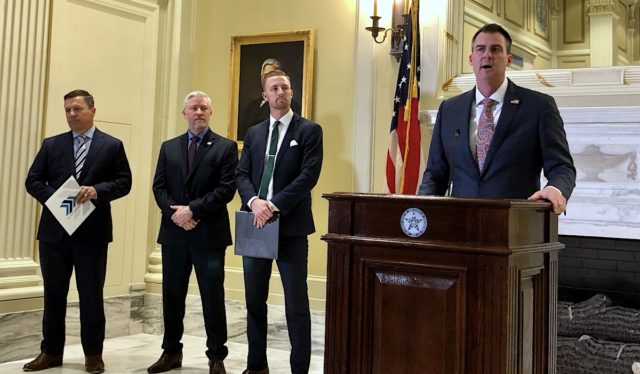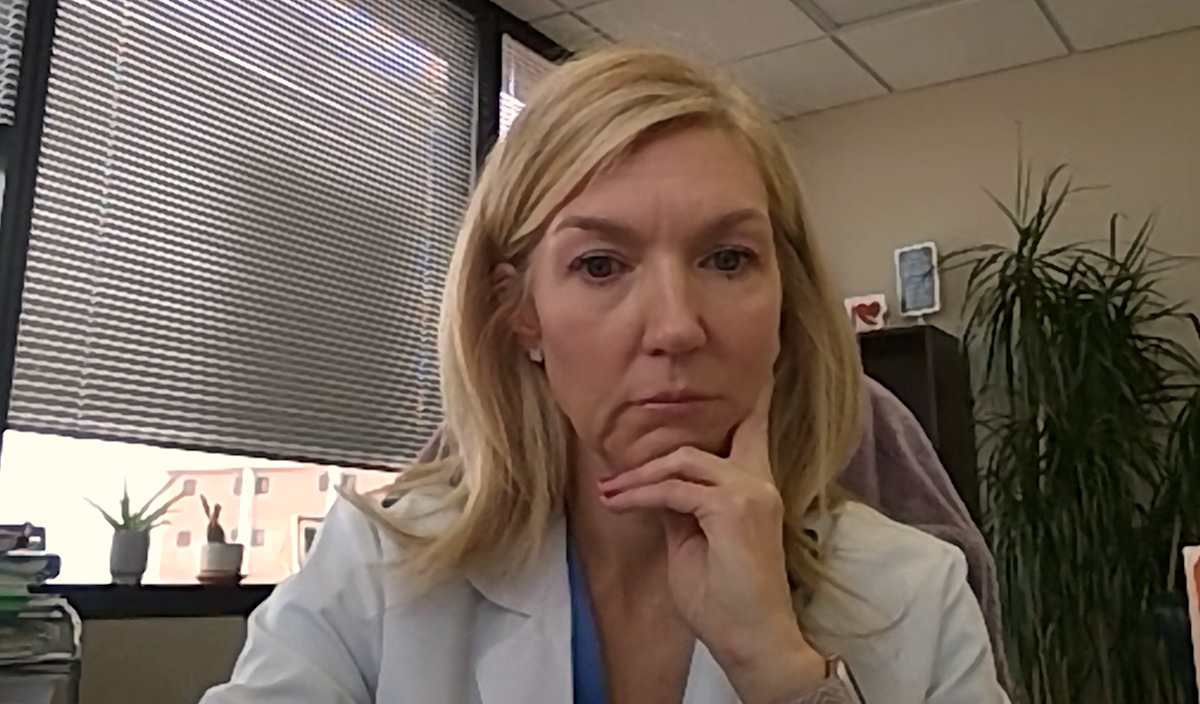
With hospital leaders saying Oklahoma City’s health care system is “at a breaking point” and school districts around the state struggling to stay open during the latest COVID-19 surge, Gov. Kevin Stitt today announced an executive order authorizing state employees to fill in at public schools that need staffing assistance and said he is committed to meeting whatever needs are identified by hospitals.
“The core mission of all of our 32,000 state employees is to serve the public and to help make Oklahoma a top-10 state,” Stitt said. “Let’s come together. We’re going to think outside the box, and we’re going to help keep 100 percent of our schools open across the state of Oklahoma.”
Joining Stitt at his press conference was State Chamber of Oklahoma President and CEO Chad Warmington, who announced the creation of a “guest educator program” aimed at connecting private sector employees with their local school districts who need substitute teachers. The website Warmington cited directs those interested in helping to visit a State Department of Education page listing all public schools, and potential substitutes are instructed to call or email their local school district directly about providing assistance.
Stitt and Oklahoma Chief Operation Officer Steven Harpe said they expect state employees to begin serving in public schools Wednesday. They will be paid their normal state wage or salary, and Secretary of Education Ryan Walters said all additional persons paired with public schools will be required to pass standard background checks, avoid inappropriate conduct with students and follow state and local laws and rules.
“There are clear expectation of what is expected from a sub and how they will behave,” Walters said.
House Minority Leader Emily Virgin (D-Norman) released a statement criticizing the governor for not taking more direct action to try and slow the spread of COVID-19.
“Health care workers have been on the front line of this pandemic since day one,” Virgin said. “Their dedication to serving their communities in this difficult time is nothing short of heroism. When the people of Oklahoma elected Gov. Kevin Stitt, they gave him a platform to lead Oklahoma through good times and bad. It is past time for him to use that platform during this pandemic to advocate for vaccines, boosters, and other life-saving measures.”
Hospitals consider emergency declaration request

Two hours before Stitt’s 1 p.m. announcement, the chief medical officers of the major hospitals in Oklahoma City held their own press conference to plead that the public get vaccinated (and boosted), wear masks, avoid crowds and only visit their overflowing emergency rooms under truly emergency situations.
“Oklahomans, please work with us until we are on the other side of this surge,” said INTEGRIS Chief Medical Officer Dr. Julie Watson, noting that backlogged emergency departments are causing some of those waiting to become upset and angry with hospital employees. “We also need your grace and patience as we struggle to provide the best possible care.”
Watson said hospital staff are strained by the same scenarios facing other citizens: personal COVID-19 infections, sick family members and closed schools and day cares complicating parental situations.
Most notably, however, Watson said the combined hospital systems of INTEGRIS, Mercy, St. Anthony’s and OU Health had no available intensive care unit beds this morning and had 117 patients waiting for available beds in other parts of their hospitals.
“As all of us have mentioned, please don’t go to the emergency room unless you have a true emergency,” said OU Health’s chief COVID officer Dr. Dale Bratzler, who said Oklahoma currently ranks 13th nationally in active cases and is about a week behind eastern states in terms of experiencing this coronavirus wave, which means numbers are expected to continue climbing. “You have to be consistent with this practices of wearing masks, doing hand hygene, avoiding crowds of other people.”
Asked if the hospital system chief medical officers have considered requesting state or Oklahoma City leaders to redeclare a state of emergency and attempt to trigger additional flexibility in staffing and other operational areas, Bratzler and most of his hospital peers were silent. Only Watson eventually answered, saying that hospital leaders have a weekly call with interim Oklahoma Commissioner of Health Keith Reed.
“That is something we have begun to raise int he last week or so. Obviously, we all want to understand clearly what declaring a state of emergency would change, would afford us, would give us access to that we don’t have now,” Watson said. “Those conversations are being resurrected. Again, we’re kind of in the frying pan and certainly trying to fight the fire while we figure out what kind of policies we could all use. So I would say that conversation is being resurrected, how could that help us get through what we likely believe is a couple more weeks of cases increasing — hopefully a little less, no one knows.”
Asked Tuesday afternoon about potentially redeclaring the state of emergency declaration he allowed to expire in May 2021, Stitt said he and his administration discuss the pandemic daily and are committed to “giving our hospitals everything they need.”
“If there are things that we can wave, if there is bureaucracy, if there are things that hospitals need, we will absolutely look at those. But I have not heard of those,” Stitt said. “We’ve heard about some non-medical staffing needs, so our Department of Health have just briefed me that they were connecting them with some of the personnel services across the state to provide them with some of their non-medical needs.”
Asked how he would respond if hospital leaders came to him requesting a temporary emergency declaration for specific purposes, Stitt hinted at other potential executive orders.
“There’s a difference between waiving a bureaucratic policy and declaring an emergency in the state of Oklahoma,” Stitt said. “So we would give them everything they need and waive any kind of bureaucracy or hinderance for them taking care of patients, so that would be our commitment.”
Hospital leaders continued to emphasize the value of vaccination against SARS-CoV-2, which causes COVID-19. On Monday, INTEGRIS posted on Facebook that of their 283 COVID-19 patients hospitalized, 68 percent are unvaccinated while 32 percent are fully vaccinated.
Mercy Chief Medical Officer Dr. Chad Smith said 58 percent of COVID-19 patients hospitalized at Mercy locations have had no or only partial vaccination. He said only 7 percent of the inpatient population has had the primary vaccination series and the recommended booster.
“Please get boosted,” Watson said. “It is a game changer for you.”
Follow @NonDocMedia on:





















